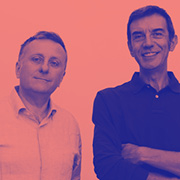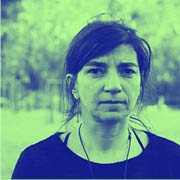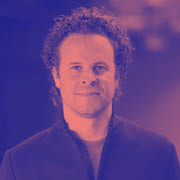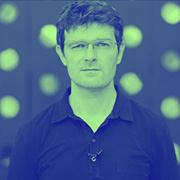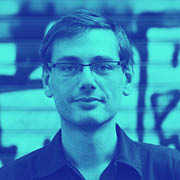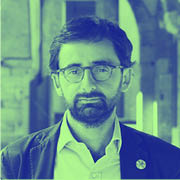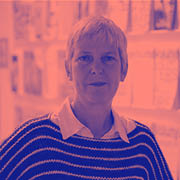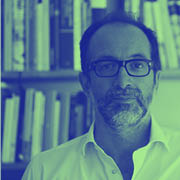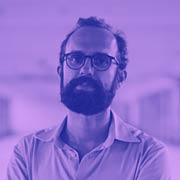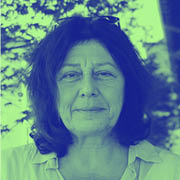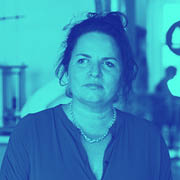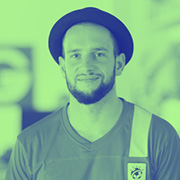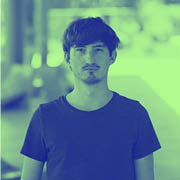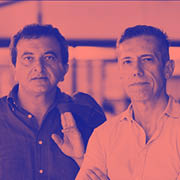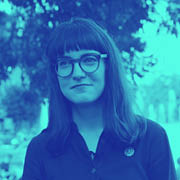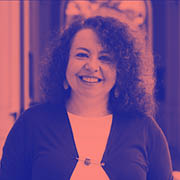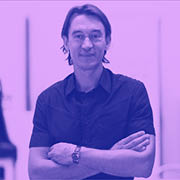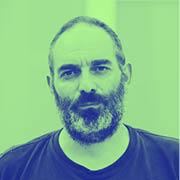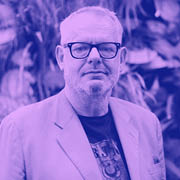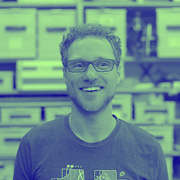DIRECTOR WAAG SOCIETY
MARLEEN STIKKER
Marleen Stikker is president and co-founder of Waag Society, a research institute for creative technologies and social innovation, and founder of De Digitale Stad (The Digital City)
in 1994, the first virtual community introducing free public access to the internet.
TERMS
responsibility
commons
open
super-cooperators
NEW ECOLOGIES
RESPONSIBILITY
One of the problems that we presently face is that we don’t know who is responsible. We talk about planets, cities, structures, citizens and ecological systems that are out of control and we always try to figure out who it was who did something wrong. Did we as consumers? Did our government? Is something out of control that we do not even have in our own capacities to change? If we think about New Ecologies I think we have to be more clear about that. I would suggest that we are all individually responsible. We can’t point to others. That would mean that we have more responsibility but that would also mean that we have more ownership. The problem at the moment is that there are so many systems, cities, companies, organizations that we don’t know how ownership is organized. They are not accountable therefore we feel that neither are we. For me, responsibility is a sort of a key element in creating new ecological systems.
URBAN ASSETS
COMMONS
I think the commons is one of the key questions at the moment. For example, Amsterdam is selling a lot of land and becoming increasingly privatized. The middle of big cities, are falling into the ownership of investors and companies that speculate on doing something with it in the future. These are no longer places that are still part of public domain but rather the global structures of financial speculation. We have a whole ideology about markets and I think we have to build new concepts and principles around commons to gain a better understanding of our cities and the world.
DIGITAL TOOLKIT
OPEN
A lot of technologies that are in our society are not truly open. Instead, we are giving the key to organizations to control our lives. Open would be a principle for having socially inclusive cities, embedded with open technologies. It is not just so that we will have nice stuff to consume and a digital toolkit to create our own apps with. We have to get beneath the surface of these applications and tools and think harder about algorithms and their instructions – how they are shaping people’s ideas of inclusion or exclusion. They also influence social structures so open would be one of the principles of the smart city. I don’t like the concept of ‘smart cities’ but the driving force for open would lead to a different type of city structure than one based around closed technologies.
NEW COLLECTIVES
SUPER-
COOPERATORS
Super-Cooperators is a term coined by Martin Nowak & Roger Highfield in their book of the same name. They claim that we are living in a paradigm defined by the survival of the fittest, so we are all in competition with each other, as if this is human nature. It is also used in market terms justifying that we have to compete. Cities must compete, economic systems must compete, we all have to compete for the sake of growth. Instead ‘Super Cooperator’ suggests that the person or organization that cooperates has the better chance for survival and proves this mathematically. We need this paradigm shift. We have to come away from the idea that we are doomed to compete that is perpetuated by our education systems, our cities and our economic markets. Instead, we are all super-cooperators, a collective as a human species.
INTERVIEWED BY
CRISTINA AMPATZIDOU
Marleen Stikker discusses the professionalization of language and how the Waag Society aims to bridge the gaps in this has created in democraticing technology.
link
WAAG SOCIETY
waag.org
CA:
This project is looking at the role that vocabulary plays in the way we understand things and in the way we communicate with people from different backgrounds. What do you think characterises this common vocabulary today and what are things we should change about it and the words we use to talk to each other?
MS:
I recognise that it is problematic that people come from different backgrounds and have been taught to use terms differently. I’m very hopeful for the future because people are actually getting together and talking to each other. When you are young, you always use the same terms. Then you begin your education and five years later people don’t understand each other anymore. Education has heavily influenced this idea that you have to professionalize and have your own language. I think if we would go back to what our values are and back to the terms that I wanted to add to the dictionary it would change a lot. If you think about competition and cooperation you can use these terms in your own context but you can’t define them together. I think we need to re-think and re-define language together because there is a lot of it being used to exclude people. If you don’t know certain language you are identified as ‘not a professional’, be it an urban planner, architect, designer or an artist. At the moment we use language to exclude each other.
We need to re-think and re-define language together because there is a lot of it being used to exclude people.
link
BLOCKCHAIN
blockchain.com
CA:
Can you give some examples of that?
MS:
If I look at technology, an example would be blockchain. A lot of people have no clue what blockchain refers to. If you don’t understand the term blockchain then you are dismissed from the discussion. Whereas underlying the concept of blockchain is the idea of an open, transparent system. In that regard there are a lot of other fields where this is relevant to practitioners. For example, there is a lot of language in technology and mystification around that technology. I think this is very problematic because people tend to not get involved. Similarly, in the arts there is a lot of language that people are using to make themselves very important. There is a whole canon of language and it doesn’t help. Like the concept of autonomous art - what is it? Nobody is autonomous. If you are autonomous you don’t survive. So there are a lot of concepts in arts that just don’t work. They become a defence rather than opening a discussion to collaborate, work together or to be understood by others.
CA:
From your own experience, do you have a story where you have encountered, misunderstanding, or a situation where these different ways to understand language have led to a funny or disastrous kind of collaboration?
MS:
I think this is the story of our lives. We at Waag invented a new environment where science, art and social thinking come together and I think we are in the middle of creating a new language ourselves. I think the most problematic terminology that has been introduced into the vocabulary is the term ‘creative industries’. This has significantly damaged the internal dialogue that should exist in the arts and culture. We have been seeking to avoid the creative industries label being put on our practice. It is something that is part of our activities but we see ourselves under the umbrella of the arts whereas in the Netherlands, design, architecture and visual culture is put under the umbrella of creative industries. So we are fighting this perception to say that we move between art, design and even science in our work. This is very difficult because cultural policies are not organized to recognise us in this way. Some people believe that using the term creative industries helps them to be relevant but it also takes away the need for curiosity driven research and disruptive forms of art as there is not an ’industry’ that wants to pay for it. The label creative industries embed us in the conventional financial system of venture capital and competition. I think this is very devastating to what we do – trying to figure out what real value is and illustrating how there are new value systems being created at the moment.
project
PET SHOP FOOD BAR OPENING
Waag Society's most recent project, the Pet Shop Food Bar, will be held in cooperation with BigPicnic and 15 botanical gardens and focuses on food security in the future. Image courtesy of Waag Society
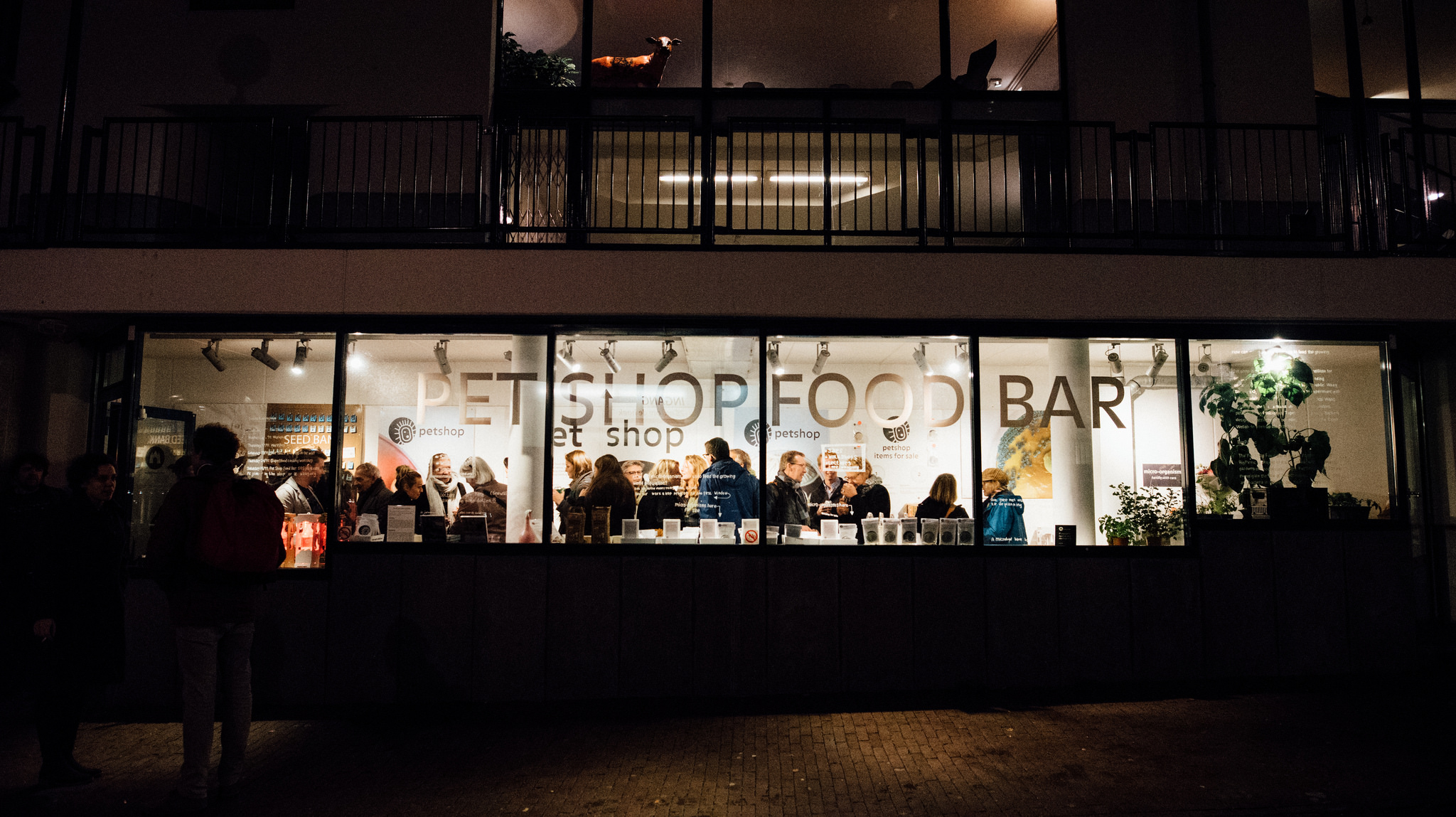

CA:
You often refer to a particular statement: ‘if you can’t open it, you don’t own it’. Can you tell me why you emphasise this phrase and why it is so important to you?
MS:
It is a phrase of the makers movement and of critical engineering - critical making - and I identify with that movement. I think the combination of open and ownership, coupled with responsibility, is very important. More and more systems are becoming closed instead of being opened, especially technologies that are embedding themselves in our societies such as Facebook, Uber and Airbnb. These are closed systems that are using the openness of the internet. A lot of the intelligence is moved away from us. If we look at the Internet of Things, licensed technology and software is embedded in almost every object. When you buy a new car, you might own the physical parts but you do not own its software, the ‘intelligence’ of the car. It means that you can’t repair the car and you remain reduced to a consumer – something I find very dangerous. The opposite of being a consumer is being a maker and having an active part in the creation of things. The concept of open is essential to that.
More and more systems are becoming closed instead of being opened, especially technologies that are embedding themselves in our societies such as Facebook, Uber and Airbnb.
CA:
You talked earlier about smart cities. In a similar vein to what you just discussed, smart city technology continues to favour big software companies and other corporate systems which can result in ignoring the associated ethical and social dilemmas that come with the application of technology. Do you have any recommendations of how we could reverse this and apply technology in our cities in more socially just ways.
MS:
There is a lot of rhetoric about smart cities, mostly from companies with an invested interest in applying these technologies and selling their stuff. They highlight societal challenges and they present technological solutions with cities managed by operating systems – cities that are smart and harness big data. It is a very big dream because it glosses over the obsolescence of technology. We know that, on a daily basis, we deal with our computers, with our telephones and with our technology failing us, If you are doing a presentation you are always afraid that something will not work, that moment of panic: ‘Is my computer talking to the other machine?’ There is a lot of anxiety about whether technologies really work’. Yet the dream that technology will integrate fluidly and seamlessly into our lives persists and that will simply not be true. Now we even see the first autonomous cars - cars that under certain circumstances actually kill people - so it can both enable and threaten us. I think the starting point is that technologies are not neutral. Technologies are systems, instructions, algorithms that are based on certain assumptions, and we have to talk about these assumptions within these systems. Unfortunately, we cannot presently say we have these answers. Instead, we have to talk about the principles behind the technologies that we want to implement. If we talk about these principles our technologies can become more inclusive, open, societal and accountable. If we do not have this discussion however, our cities will continue to utilise closed technology which is not accountable and where we don’t hold the keys. Overlooking digital interception and sabotage, the nice part is that we have some choices to make. The worse case scenario is that we don’t have any choice because the oldest technologies are already intercepted and we are part of one big illusion where we may no longer be in charge at all. We can go either way but I would always pick the path where choice exists.
CA:
I would like to ask you about hacking – as a word but also as a notion. As a word it has a very tormented history, it started as a very exploratory tinkering with computer systems, then it became associated with criminal-like activities such as breaking into somebody else’s system and now it is somehow re-surfacing as a creative attitude towards everything. We talk about civic hackers, life hackers and Ikea hackers. Is this merely hype or is it really a new ideology? What potential does it have for application on a larger scale when we think about cities and not just technology.
MS:
For me hacking is the demystification of systems and structures. In the beginning it may have been characterised as tinkering, playing around and showing, ‘I know more than you, you think that you are closed but I know how to open your door’. This is still at the core of hacking but of course you can adapt this ethos to any system. The ethos of not taking a system for what it is, of wanting to get inside it. I think the idea that we want to hack economics, cultures or cities rises from wanting to be at the heart of a systematic change rather just a user. This is not something that will go away and is at the core of active citizenship. It is about being an actor, an agent, someone in the middle, instead of on the outside. Of course hacking has always been discussed in terms of ‘trespassing’, and ‘permission’ as well as questioning whether it serves simple playfulness, real societal change or just makes you money. A lot of people have entered hacking so we can’t deny that money making has become part of its culture with even government agencies engaging in it. The CIA, Russia and China all engage in hacking. We now see hacking as part of our political systems such as with Hillary Clinton’s email hacks. It is a complicated area at the moment, but as long as it helps people to demystify systems that we are told are too complex for us to understand, be it technological or societal, then I think we need more hacking. However, we also need to be aware that hacking is not simply altruistic in intent.
project
HACKING CULTURE BOOTCAMP @ WAAG SOCIETY
image courtesy of Sebastiaan ter Brug
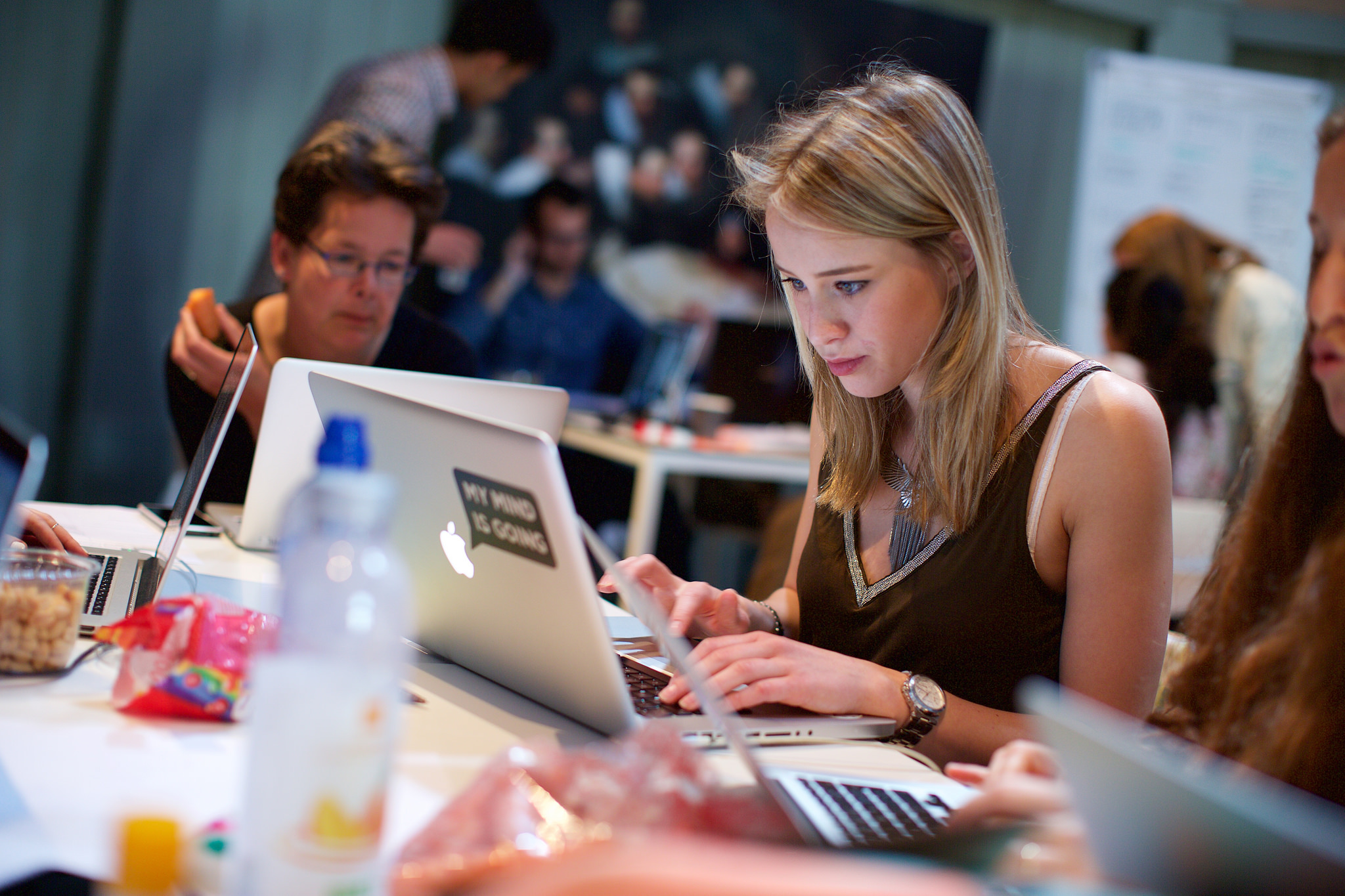

The idea that we want to hack economics, cultures or cities rises from wanting to be at the heart of a systematic change rather just a user.
CA:
Are you called the Waag Society because you were always located in this building or does it have to do something with the approach towards science, observation and opening up?
MS:
First we were called Society for Old and New Media, but people referred to us as Waag and then we shortened it to Waag Society, as it really was ‘waag’ (scales) for society. For us it is the art of technologies for societies that we are looking into. Waag has a double meaning – it is related to weighing but also to the building where we are based – the Waag (weigh house), which has a whole parallel history to it. Theatrum Anatomicum located at the top floor of it, was where historically human bodies were dissected and now we established the wet lab, where we create life. There is a lot of relationship between what we do and the history of the Waag. This is why we use this term.
The Theatrum Anatomicum sought to demystify the body and there was a whole ritual around that. Now that continues in a fashion, when we are making life we also have all kinds of rituals - new rituals - raising more ethical questions about whether we are allowed to do this. I feel there is a real historical parallel to what has been done in 17th century here.
